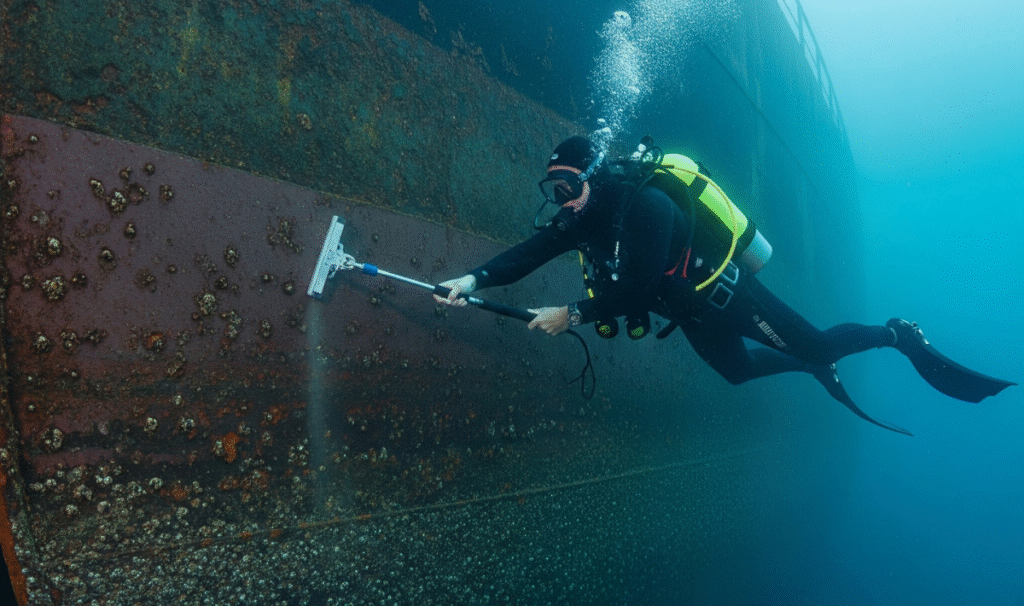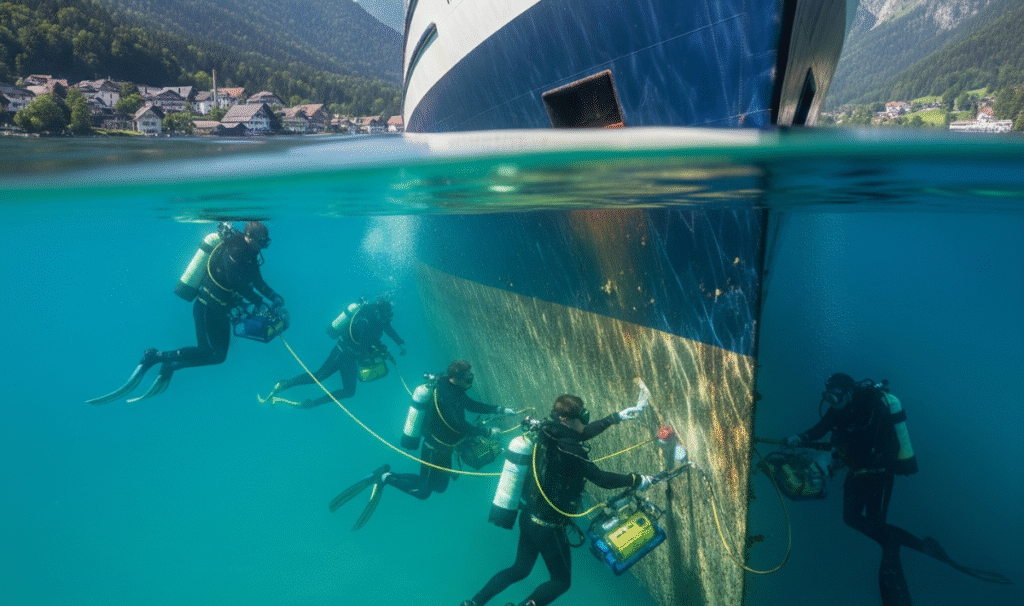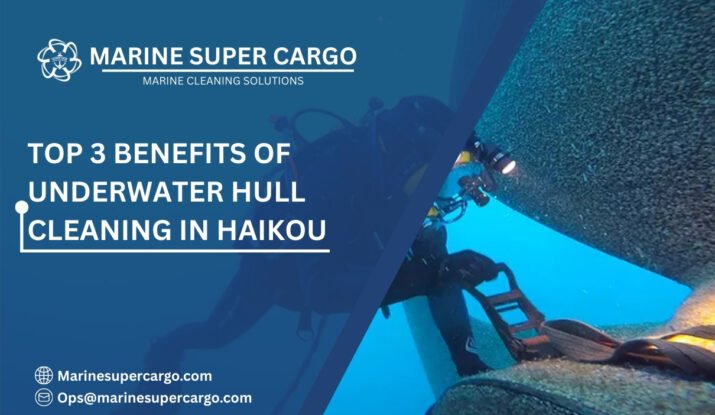When most people think of ships, they imagine towering decks, roaring engines, and containers stacked like skyscrapers. Yet the true heart of a ship’s efficiency lies beneath the waves—its hull. Over time, this surface becomes coated with barnacles, algae, and slimy growth, creating invisible resistance that slows a vessel dramatically.
In one of China’s southernmost gateways to the sea, underwater hull cleaning in Haikou is becoming indispensable. Haikou’s location on Hainan Island, surrounded by warm tropical currents, makes it a hub of maritime activity but also a hotspot for rapid biofouling. For ship operators, regular hull cleaning is no longer just about good maintenance—it’s about boosting performance, protecting the environment, and saving money.
Let’s explore the three key benefits of underwater hull cleaning in Haikou and why this practice is transforming modern shipping operations.
What Exactly is Underwater Ship Hull Cleaning?
The Basics of the Process
Hull cleaning is essentially an underwater tune-up for ships. Using specialized brushes, suction devices, and sometimes advanced robotics, skilled divers remove marine growth from a ship’s submerged surfaces. The goal is simple yet powerful—restore the hull’s smooth profile so it glides through the water effortlessly.
Vessels that undergo underwater hull cleaning in Haikou immediately notice fuel efficiency improvements, reduced drag, and better maneuverability.
Why Haikou is an Ideal Hub for Hull Cleaning
Haikou sits at the northern tip of tropical Hainan Island. Its warm, shallow, nutrient-rich seas are perfect for marine organisms—but disastrous for ship hulls. Heavy cargo traffic in and out of Haikou’s ports means more vessels need regular cleaning to keep up performance. By hosting eco-conscious marine services, Haikou has grown into a strategic destination for reliable hull maintenance.

Improved Efficiency and Fuel Performance
How Biofouling Slows Vessels Down
Think of a swimmer dragging fishing nets—it doesn’t matter how strong their arms are, the added resistance tires them quickly. Similarly, a ship with a fouled hull works harder, consumes far more fuel, and still loses speed. Research from imo.org shows that even light slime layers can spike fuel consumption by at least 10%, while heavy fouling can raise it over 30%.
The Direct Impact on Speed and Handling
Once underwater hull cleaning in Haikou is carried out, captains often describe smoother handling, faster acceleration, and reduced vibration from engines. With drag gone, the ship regains its natural agility, saving on fuel costs and completing journeys faster.
Environmental Protection and Global Compliance
Limiting the Spread of Marine Biofouling
Marine hitchhikers—barnacles, algae, tiny mussels—aren’t just nuisances. They often travel from one region to another, upsetting delicate ecosystems. By committing to underwater hull cleaning in Haikou, vessels avoid being unintentional carriers of invasive species, safeguarding local biodiversity.
Staying Compliant with MARPOL and IMO Standards
The MARPOL Convention highlights pollution prevention as a global priority. Similarly, iaphworldports.org supports clean-hull policies in sustainable port programs. Ships that neglect hull maintenance risk fines, denied port entry, or reputational losses. Regular underwater hull cleaning in Haikou keeps vessels aligned with industry standards and avoids costly penalties.
Long-Term Savings and Structural Protection
Avoiding Corrosion and Hull Damage
Marine growth locks in moisture. Over time, this not only eats at protective coatings but also accelerates corrosion, weakening the steel underneath. Regular underwater hull cleaning in Haikou acts like a shield—it protects ship coatings, prevents rust, and slows long-term degradation.
Lowering Maintenance and Repair Costs
Clean hulls help operators avoid surprise repair bills. Instead of facing emergency dry-docking or large-scale corrosion treatments, companies save money with predictable cleaning schedules. Over the years, the financial benefits of underwater hull cleaning in Haikou far outweigh the service costs.
The Strategic Role of Hull Cleaning in Today’s Shipping
Contribution to Carbon Reduction Goals
Fuel waste isn’t merely an expense—it’s a climate issue. The International Maritime Organization stresses how reducing greenhouse gas emissions is one of shipping’s greatest challenges. According to cleanship.co, Underwater hull cleaning in Haikou contributes directly by cutting unnecessary fuel burn, thus lowering carbon emissions in line with global goals.
Haikou’s Growth as a Sustainable Maritime Hub
Haikou isn’t just following trends—it’s shaping them. By promoting greener port practices and eco-focused cleaning, this city is positioning itself as a forward-thinking maritime hub. The result? Ships that dock here enjoy compliance, efficiency, and sustainability all in one.
Best Practices for Underwater Hull Cleaning in Haikou
Certified Divers, Tools, and Eco-Friendly Techniques
The best cleaning isn’t rushed—it’s precise. Certified divers trained under standards from imca-int.com ensure hull cleaning in Haikou is effective and safe. They use specialized tools to remove growth efficiently without stripping protective coatings or harming ecosystems.
Cleaning Combined with Regular Vessel Checks
Forward-thinking operators combine underwater hull cleaning in Haikou with full inspections of rudders, propellers, and thrusters. This dual approach uncovers hidden issues early while delivering clean, high-performing hulls.

Challenges and Considerations in Haikou’s Waters
Seasonal Factors and Marine Growth Conditions
Haikou’s tropical seas mean fouling happens fast. In summer, the warm waters accelerate growth, forcing ships to stick to stricter cleaning schedules. Operators who skip underwater hull cleaning in Haikou risk rapid biofouling and higher costs.
The Balance Between Speed and Eco-Responsibility
Aggressive cleaning methods may speed things up, but can harm coatings and leave harmful debris in the water. That’s why eco-conscious practices are increasingly vital in Haikou. Proper underwater hull cleaning in Haikou strikes this delicate balance: effective but environmentally safe.
Conclusion
Every ship dreams of gliding through water like a blade through silk—but marine fouling turns that dream into resistance, wasted fuel, and hidden damage. That’s why the three core benefits of underwater hull cleaning in Haikou—greater efficiency, environmental responsibility, and cost savings—are impossible to ignore.
For fleet managers, investing in cleaning is about much more than maintenance. It’s about protecting profits, preserving the seas, and preparing ships for a greener future. In Haikou, a city steadily shaping itself into a sustainable shipping hub, the practice has become not just smart—it’s strategic.
FAQ:
Q1. How often should underwater hull cleaning in Haikou be carried out?
Depending on vessel type and routes, cleaning is generally recommended every 6–12 months, with tropical waters like Haikou often requiring the shorter interval.
Q2. Can hull cleaning reduce a vessel’s carbon footprint?
Yes. By reducing drag and fuel burn, underwater hull cleaning in Haikou supports global carbon-reduction efforts.
Q3. Is the process safe for marine ecosystems in Haikou?
When performed by certified providers using approved methods, hull cleaning meets eco-friendly guidelines set out by IMO.
Q4. Does regular hull cleaning save money in the long run?
Definitely. Preventing corrosion and heavy fouling reduces costly repairs and extends ship lifespan.
Q5. Why is Haikou emerging as a hub for underwater hull cleaning?
Its tropical climate demands frequent cleaning, and its maritime infrastructure makes Haikou a growing leader in eco-responsible ship services.


